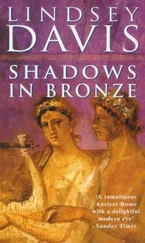Lindsey Davis - Deadly Election
Здесь есть возможность читать онлайн «Lindsey Davis - Deadly Election» весь текст электронной книги совершенно бесплатно (целиком полную версию без сокращений). В некоторых случаях можно слушать аудио, скачать через торрент в формате fb2 и присутствует краткое содержание. Год выпуска: 0101, Жанр: Исторический детектив, на английском языке. Описание произведения, (предисловие) а так же отзывы посетителей доступны на портале библиотеки ЛибКат.
- Название:Deadly Election
- Автор:
- Жанр:
- Год:0101
- ISBN:нет данных
- Рейтинг книги:3 / 5. Голосов: 1
-
Избранное:Добавить в избранное
- Отзывы:
-
Ваша оценка:
- 60
- 1
- 2
- 3
- 4
- 5
Deadly Election: краткое содержание, описание и аннотация
Предлагаем к чтению аннотацию, описание, краткое содержание или предисловие (зависит от того, что написал сам автор книги «Deadly Election»). Если вы не нашли необходимую информацию о книге — напишите в комментариях, мы постараемся отыскать её.
Deadly Election — читать онлайн бесплатно полную книгу (весь текст) целиком
Ниже представлен текст книги, разбитый по страницам. Система сохранения места последней прочитанной страницы, позволяет с удобством читать онлайн бесплатно книгу «Deadly Election», без необходимости каждый раз заново искать на чём Вы остановились. Поставьте закладку, и сможете в любой момент перейти на страницу, на которой закончили чтение.
Интервал:
Закладка:
Lindsey Davis
Deadly Election
July AD 89
1
Never hold an auction in July. In Rome, who’s around then? People who can escape will have fled to rural retreats in cooler parts of Italy. The rest are on their deathbeds or have stayed here to avoid relatives.
Hopeless. Everybody’s tunic is sticking to them; sweat pours down their greasy necks. Porters drop things, then storm off in a huff. Sellers vacillate and buyers renege. Dockets go missing. Payments ditto. Wild dogs invade and scatter the punters. Afterwards, somebody points out that no advertising notice was ever put up in the Forum. Rival auctioneers are not bothering to gloat at your poor takings: it’s too damned hot.
My father owns an auction house and in high summer he hides away at his seaside villa. His staff keeps the family business chugging along. It’s always a quiet period.
Nothing was different in the year of the consuls Titus Aurelius Fulvus and Marcus Asinius Atrantinus, except that before one sale in July our workers found a corpse.
I was in Rome. I had been at the coast, carried off there by my mother – ‘rescued’, she said – during an illness that had nearly killed me. She plucked me from my apartment and took me off to the family spread, south of Ostia. After three weeks of people fussing, I was longing to come back. A friend had originally found me lying half dead and gallantly saved my life, so I wanted to thank him properly and believed I was now strong enough for city life.
You may be thinking this friend and I were lovers. How wrong you would be.
It was an all-day journey by rackety cart down the Ostia Road to Rome. That really drained me. As soon as I stepped into my stuffy and silent apartment on the Aventine, I knew I was too weak. I stayed in bed for two days, fortunately sustained by a hamper of dainties from my mother. Lonely and tearful, I propped myself on pillows and munched my way through everything. I thought I had no appetite, but I had been a starving street child once. I hate waste.
All too soon, I licked out the last little dish of aspic salad. I would now have to fend for myself – or crawl back to the parents ignominiously. No chance of that.
Still, I love them. They adopted me when I was lice-ridden and desperate, a difficult teenager to whom they were loyal and affectionate when others would quail. They had turned a lost soul from far-away Britain into a fairly normal Roman daughter. I was now twenty-nine and an independent widow, but I had whined and argued to come back from the coast, worming away at it like my two younger sisters when they wanted new sandals.
‘Go, then. We’ll keep your bed made up!’ the parents scoffed. So now I had to live up to my claim of being fit.
I forced myself to drag on a tunic. Slowly, I descended a flight of outside stairs towards a balcony walkway. This half-rotten structure, a so-called fire escape, was inaccessible to most tenants. It ran around the bare interior courtyard, once a laundry but nowadays deserted. I lived in the Eagle Building, Fountain Court: one of many dark, creaking, stinking tenements in which miserable, poverty-stricken Romans – most of us – endure what passes for life. The edifice was full of inadequate apartments and prone to extremely odd smells. Father owned it, I regret to say. This did not add lustre to his reputation, though since he was a private informer, it was low to start with. People were amazed he had the money to possess a building – though much less amazed once they heard he was also an auctioneer, a profession that is famous for wealth.
I was an informer myself. Public opinion was even harder on me, because a respectable woman ought to remain at home all day. I should be weaving at my loom in a gracious atrium, between beating my inoffensive slave-girl or screwing a litter-bearer rather than my husband. Stuff that for a game of knucklebones. ‘Loom’ was a dirty word among my mother, sisters and me. I didn’t own a slave-girl and my husband died ten years ago. I worked. Not that I felt like it at the moment.
I crept down the steep stairs a few at a time. It was always worth taking care in this building in case part of it fell down on you. Who wants a broken back and dry rot in their hair?
I was testing myself. If I felt faint, I had a one-room bolt-hole off the first-floor walkway, where I could fall onto an old couch and recover my strength. Otherwise, I could shout myself hoarse, which just might summon the building’s porter, Rodan. Given clear instructions and some loose change, he would go for help.
Not needed. I made it down to the walkway. I felt better than expected. Aspic salad is full of goodness. Helena Justina might be annoyed with me for running off, but she knew how to impress on me that I still needed a mother. I was the craziest of her four stubborn children, but she would not let me fade away.
I leaned on what passed for a handrail, though I applied my weight with caution. Particularly unpleasant lichen gave clues to the rotten bits. Touch it, and your hand came up covered with grey-green slime. Something about its texture was even worse than the pigeon guano, although there was plenty of that too.
For once Rodan was in sight. An elderly ex-gladiator, scarred by rent-collecting among the violent poor rather than by fights in an arena, he was a heavy lump of lard who stood in the porch, arguing (his reaction to any request). He was with a runner I recognised from Father’s auction house. I watched them.
Messengers in Rome are used to hassle. This man, Cyrus, stood in silence letting Rodan’s pointless pushiness wash over him. If Cyrus had come from the Saepta Julia, where the office was, he would have had a good walk here, with a steep climb up the Aventine at the end of it. He was taking a breather in case he had to turn around and go straight back, mission unaccomplished. In contrast to Rodan’s ugly shaved head and the huge sweat stains on his ragged tunic, Cyrus was neat. In his forties, he had trimmed hair, laced footwear, a white tunic that was limp in the heat though not grimy. He was slim, though not from going hungry. My father still remembered what poverty was like, so he was a decent employer. Nor were his employees crushed by constant beatings, unlike many in our supposedly civilised city.
Father employed Rodan too, but Rodan was beyond help.
I called out. Rodan immediately slunk back into his smelly cubicle. Cyrus came across the courtyard and gazed up at me, one level above. Still light-headed, I was trying not to sway.
‘Flavia Albia! We heard you were home.’ He looked relieved to have found me. ‘I don’t suppose your father will be city-bound himself any time soon?’
‘Sorry, Cyrus, it’s July. Falco is out in a small boat every day, with one hand glued to a fishing rod and the other clasping a wine gourd.’
‘Any fish biting?’
‘No, he just likes wearing a silly hat and dreaming. But once in a while he lands a very beautiful statue that he claims he found floating on a current … He’s turning into his old man.’ My grandfather had often rowed home from a day on the water, towing a small skiff full of gorgeous Greek art that had ‘fallen off the deck of a ship’. Such a good way for an auctioneer to avoid import tax. Wide-eyed and shameless, Geminus could make the story sound almost true.
The auction staff knew Father gave me authority to act for him, so I apologised briefly, ‘Cyrus, you’re stuck with me. How can I help?’
The messenger shrugged. ‘Oh, it’s nothing we can’t handle, but the head porter thought we should tell someone. They are getting ready for the Callistus sale. One of the lads heaved up the lid of a big box − and next thing, he’s gazing into the eyes of a dead body curled up inside.’
Читать дальшеИнтервал:
Закладка:
Похожие книги на «Deadly Election»
Представляем Вашему вниманию похожие книги на «Deadly Election» списком для выбора. Мы отобрали схожую по названию и смыслу литературу в надежде предоставить читателям больше вариантов отыскать новые, интересные, ещё непрочитанные произведения.
Обсуждение, отзывы о книге «Deadly Election» и просто собственные мнения читателей. Оставьте ваши комментарии, напишите, что Вы думаете о произведении, его смысле или главных героях. Укажите что конкретно понравилось, а что нет, и почему Вы так считаете.












